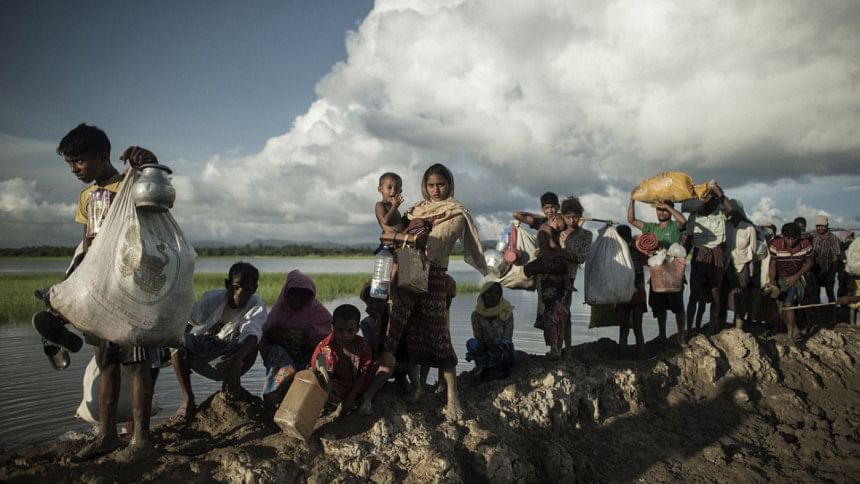2 Myanmar Soldiers’ Confession: It could be a turning point for Rohingyas

The confessions of two former Myanmar soldiers about their involvement in massacres, rape, and other crimes against Rohingyas and their transfer to the International Criminal Court (ICC) could be a turning point for justice for the Rohingyas, analysts said.
So far, the victims and witnesses to the mass atrocities against the Rohingyas shared their experiences to the UN and other investigators since some 750,000 Rohingyas fled a brutal military campaign in Myanmar's Rakhine State. This is the first time the perpetrators have confessed to the massacres and rapes, they said.
"These confessions could be a turning point for justice for the Rohingyas. This is a major development. Now, all the parties -- victims, witnesses and perpetrators -- are saying similar things," said Prof Imtiaz Ahmed, director of the Centre for Genocide Studies at the International Relations Department of Dhaka University.
In February this year, the International Court of Justice (ICJ), where the Gambia filed a case accusing Myanmar of genocide against Rohingyas, ordered in February this year to prevent the acts of genocide.
The situation, however, has deteriorated after the order.
The ICC is also investigating the issue of forcible displacement of Rohingyas from Myanmar to Bangladesh. Myanmar denied access to the ICC, saying it is not a part of the Rome Statute.
Analysts said this is the first time the perpetrators have been held. The statements from the Myanmar soldiers will be important factors to prosecute Myanmar officials responsible for the genocide.
The New York Times reported that on Monday the two men, who fled Myanmar last month, were transported to The Hague. Regional rights body, Fortify Rights, said as a state party to the Rome Statute, Dhaka notified the ICC of the presence of the two former soldiers.
Payam Akhavan, a Canadian lawyer representing the Gambia in ICJ, said the two men had appeared at a border post requesting the protection of the government and had confessed to the mass murder and rape of Rohingya civilians in 2017.
"All I can say is that those two individuals are no longer in Bangladesh," he told Reuters.
Comments from Bangladesh authorities were not available.
A statement from the ICC Prosecutor's Office said, "The office does not publicly comment on speculations or reports regarding its ongoing investigations, neither does the office discuss specifics of any aspect of its investigative activities."
Genocide researcher Ahmed Ziauddin said taking the two men to the ICC's custody requires the judges' permission and the procedure should be open. However, the ICC prosecution can hold them confidentially for the sake of investigation.
Fortify Rights said it obtained and analysed two videos showing the confessions of Private Myo Win Tun of Myanmar Army Light Infantry Battalion (LIB) 565 and Private Zaw Naing Tun of LIB 353.
These LIBs were operational in the Rakhine State during the military-led "clearance operations" against Rohingya civilians in 2016 and 2017.
Zaw Naing Tun, 30, confessed to killings, burying bodies in mass graves, and other crimes against Rohingya Muslims in five villages of Maungdaw Township during the 2017 "clearance operations."
Myo Win Tun described his involvement in killing Rohingya women, men, and children, and he admitted to raping women in Taung Bazar village and surrounding villages in Buthidaung Township in September 2017.
The soldiers provided the names and ranks of 19 direct perpetrators from the Myanmar Army, including themselves, as well as six senior commanders whom they claim ordered or contributed to atrocious crimes against Rohingya.
Both men separately claimed to be acting on orders from senior commanders to "exterminate all [Rohingyas]," to "shoot all that you see and that you hear," and to "kill all" Rohingyas in specific areas.
Significantly, both men were operational in two separate townships, simultaneously following orders under different commanders, which may indicate operational consistency between battalions, coordination, and intent to commit genocide, Fortify Rights said.
The Arakan Army -- an ethnic armed group currently engaged in armed conflict with the Myanmar Army in the Rakhine State -- filmed Myo Win Tun's confession on July 23, 2020 and filmed Zaw Naing Tun's confession on July 8, 2020.
The filmed confessions appear to be credible, said Fortify Rights. The information described in the confessions is consistent with the human rights documentation of the 2016 and 2017 Myanmar Army-led "clearance operations". These two men may be directly responsible for killing up to 180 Rohingya civilians, Fortify Rights said.
These confessions demonstrate that the Myanmar Army is a well-functioning national army operating with a specific and centralised command structure, said Matthew Smith, chief executive officer at Fortify Rights.
Prof Imtiaz said the two soldiers will be a great source of information on the genocide. It will help Myanmar's civil society and intellectuals realise that they need to seek punishment for those responsible.
It will also substantiate the case at the ICJ and another case at an Argentine court, he added.
"The big powers, who are friends of Myanmar and speak of human rights and democracy, will now consider seriously putting pressure on Myanmar," Imtiaz said.
Ahmed Ziauddin said the ICC usually doesn't prosecute such low-ranked soldiers but those who decide and order the massacres. It is uncertain whether the ICC would prosecute them or hold them only for the sake of investigation.
"However, the information gathered from the two soldiers will be invaluable. It will help the ICC catch the conspirators. This will also give strong message to Myanmar and the rest of the world."

 For all latest news, follow The Daily Star's Google News channel.
For all latest news, follow The Daily Star's Google News channel. 



Comments